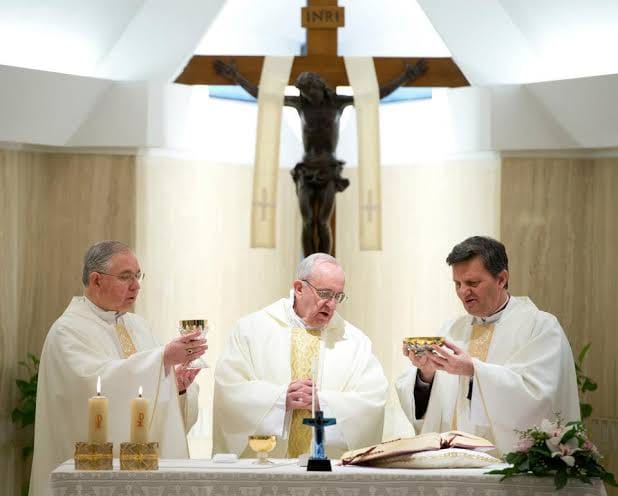
Ex. 12: 1-8, 11-14
I Cor. 11: 23-26
Jn. 13: 1-15
Today we enter into the most important phase of our faith journey; the Paschal Triduum by celebrating the memory of Lord’s Supper. Holy mother Church invites all her children to contemplate the passing journey of Jesus to His Father by fulfilling the salvific mission through his passion, death, and resurrection. It is an important day for all of us because we commemorate the institution of the Holy Eucharist, the source and summit of our Christian life and also the institution of the order of priesthood.
All the three readings of the day invite us to reflect on the centrality of the Holy Eucharist in our pilgrim journey. In the first reading, we see that God prepares the people of Israel for great liberation from the bondage of Egypt. He sends his angel to kill all the firstborn of Egyptians. The people of Israel were asked to mark their household with the blood of the paschal lamb that they kill to commemorate this intervention of God in their life. Thus the Israelites were protected from the wrath of God and they were blessed with freedom. Though they were freed, they remained under the slavery of sin and death. In the New Testament, we see Jesus the Son of God becomes the paschal lamb; offering is body and blood as spiritual food and offering himself as a sacrifice at the altar of the cross and liberates the entire humanity from the clutches of death. Jesus says: “Those who eat my flesh and drink my blood have eternal life.” (Jn. 6:54)
The second reading explains to us the institution of the Holy Eucharist through the words of St. Paul. He was not an eye witness to this event. Yet he considers the breaking of the bread, the most important event of all their gathering that unites the entire community into the person of Christ. Jesus instituted the Holy Eucharist on a pass over feast; he institutes this new covenant with new Israel by giving them His body and blood and next day he seals this covenant with his blood on the cross that we may live. When Jesus instituted the Eucharist he asked his disciples: “Do this in remembrance of me.” (Lk.22:19) Eucharist fills the entire universe with the presence of Jesus and it reminds all creation about the salvation that He has merited by dying on the cross.
St. John, the eye witness and the privileged disciple who was reclined to the Master’s chest at the time of the Lord’s Supper invite us to think about how we can live the self-giving love of Jesus – the spirituality of the Holy Eucharist in our day to day life. Jesus washes the feet of his disciples. It was unheard that a Master washing the feet of his disciples. Normally, slaves wash the feet of their Master. The Son of God, the Master of the entire universe washes the feet of his creatures and begins a new tradition based on love. “I give you a new commandment, that you love one another. Just as I have loved you.” (Jn. 13:34) Every Christian who receives the sacrament of the Holy Eucharist is called to become a servant like Jesus, who serves his fellow brethren in love. The tradition of washing of the feet on Maundy Thursday reminds us the sacrament of Holy Order is not a sacrament meant only to offer the Holy sacrifice alone nevertheless it also contains the ministerial dimension of serving the people of the Lord.
As we celebrate this great feast let us pray for each other that we may live the spirituality of Holy Eucharist in our day to day life and transform ourselves as alter Christus –another Christ. As we all know, many of our brethren are unable to partake in the Holy Eucharist today, due to the difficult situation that we face. However, when priests celebrate the Holy Eucharist today, let us join with them spiritually that Jesus, who is the heavenly manna given to entire humanity in our pilgrim journey towards our promised land may come into our hearts and heal all our brethren who are infected with Corona Virus and once again we may enjoy communion in His Church.